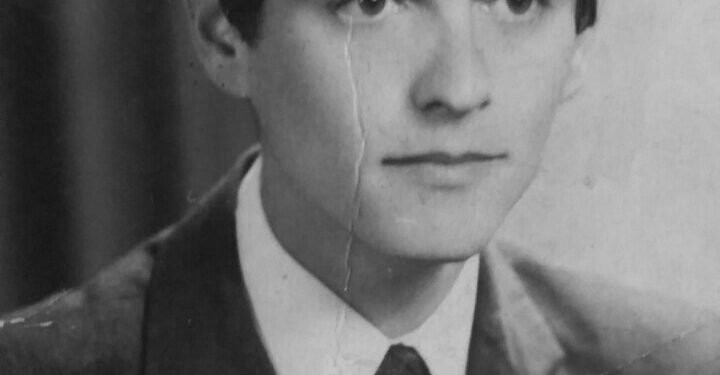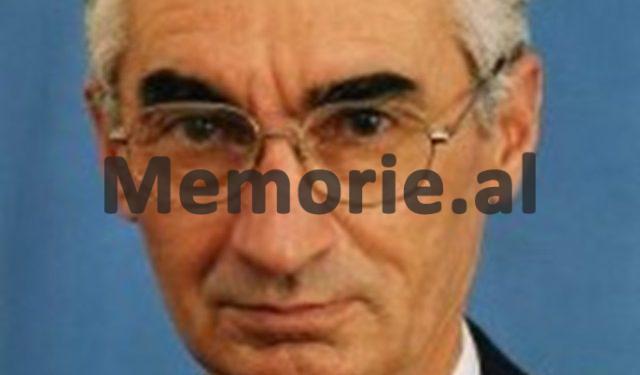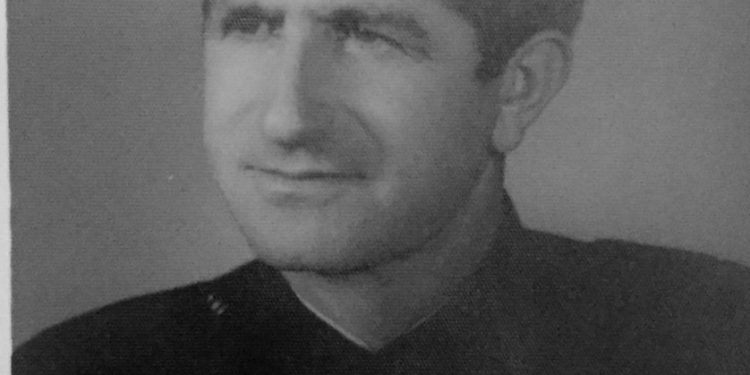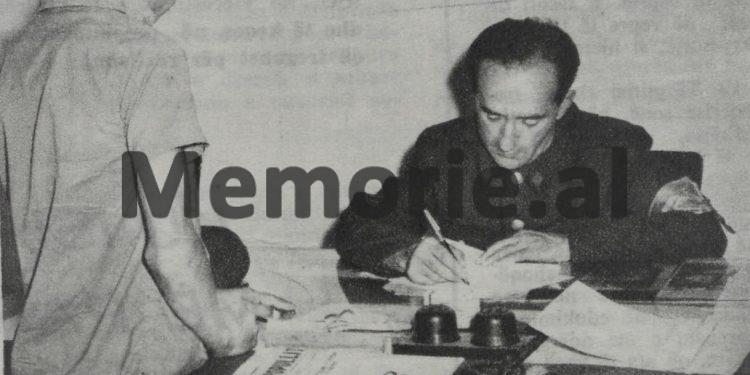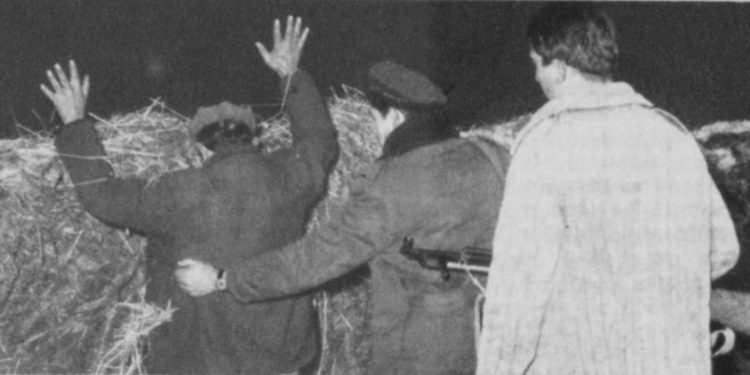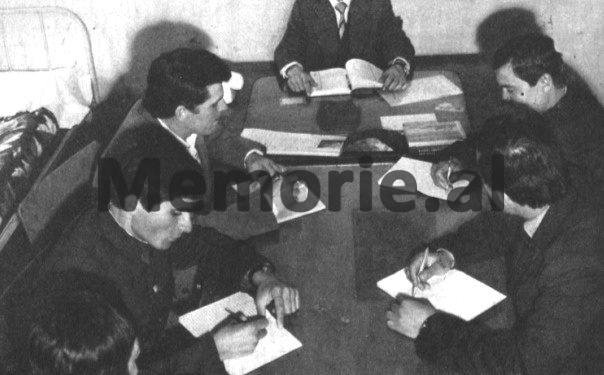By Eugene Merlika
“The way this world goes, to be honest is to be chosen among ten thousand mortals” WILLIAM SHAKESPEARE (1564 – 1616).
Memorie.al / Exactly two years ago, a death notice on a palace door, on a street in New Tirana, caused a tremor in my heart and revived the memory of a special period of my life. The name and photo of Bashkim Caka’s obituary reminded me of an event, already distant in time, 36 years ago. In a small agricultural and livestock center, about two km. far from the city of Lushnja, I worked as a builder in a building that was erected every day. It was morning and we were starting our daily work. Suddenly, two “Gaz”-51 cars, filled with officers and policemen drove between us.
Mustakoç chief of the District Security was impressed and addressed me with these words: “You are the nephew of Mustafa Kruja”?! To my affirmative answer, he added the expression, unfortunately too well known: “In the name of the people, you are under arrest”! After two hours I was in a cell, together with another man.
It was a well-known practice and this, which served to extract something from the newly arrested. After a few hours, the duty policeman came, tied my hands and escorted me upstairs to the investigator’s office, who would deal with my process.
He was a young man at the age of 27. I had not known him before; I had seen him that morning in the group of men who had come to arrest me. The first meeting with him was surprising for me. “You don’t know me, but I know you very well. My name is Bashkim Caka, my wish is to get along well, regardless of the roles we have”!
This direct recognition and those few words caused a confusion of thoughts in my brain. With the slow progress of the process, I became convinced that the words of the first meeting, or of self-acquaintance, were sincere.
The investigating boy did not insist on extracting other data, except those that his Security colleagues had brought to him, through a process – a long statement of indictment, drawn up by only one person. The union, voluntarily, limited its work to that of a “notary”, who had to turn that lawsuit document into another confrontation, with which I had to defend myself, from the accusations of a single plaintiff, moreover of a friend of mine.
In communist Albania, the legal institution, from which even the most dangerous criminals in the world benefit, had disappeared. It was called “useless” and “unnecessary”, because investigators and courts were the best “protectors” of Albanian citizens!!!
The investigation was not just a two-way conversation between me and that boy. Other characters of that cruel world intervened in it, in which he possessed the philosophy of violence, unfolded in its own, more diverse forms.
Thus, during those three and a half months of stay in the cells of the Internal Affairs Branch of Lushnja, I had to face the proverbial cruelty of Kapllan Shehu, its head, the cunning of the ministry’s investigator, the thickness to the point of naivety of to the prosecutor for investigative matters, with the determination of the prosecuting witness, to prove the charges. The union was always present, but its physiognomy changed both after the moment and the people who came there to confront me.
The essence of the message that got me through those dramatic months for me, leaving a family with many problems and a sick one-year-old child, through face-to-face conversations, was that of honest awareness of my true legal situation. .
In short, time after time, he affirmed to me that my real fault did not lie in what I was sued for, but in the last name I bore. It was not something new; it even coincided with the official truth, which framed the “guilt” of one in the “sins” of the past four generations.
In those circumstances and in those moments, it served to remove from myself the “guilt” complex, the consequences of which burdened the family and, as such, multiplied the pain, but made me take refuge in the inevitable fatality, which gave me the calm needed to postpone one by one, the days and nights of the cell. Affirmed by the official representative of the law, with whom I was confronted, that worry of the dead soul was relieved more.
“If it was someone else” – he told me – “they would have been satisfied with a public exposure, very much with a slap, and they would have taken him home”! His psychological ability, to enter into the depths of the problems that tormented the brain and conscience of the interlocutor, exceeded the limits of the ordinary.
When the prosecutor came to talk to me and make his propaganda come out, to sue a friend or other person, Bashkimi would smile and after he left, he would add: “Don’t pay attention to what he says, because I tell him me who has given us something. You continue your work.”
Every conversation with him in those months led me to the first words of acquaintance. He knew very well what anxiety and spiritual exhaustion I had gone through in the last two years before my arrest, in order not to do what the prosecutor asked me to do in soft words, but which others insisted on with the most unimaginable pressure.
Deep down, he respected what I had been able to get out of that fight for my dignity, my conscience, my honesty. He had to be honest himself, to appreciate that quality in others, especially in the “enemy”.
It was this invisible knot that connected us that no one knew and that stemmed from the strong moral values with which he was protected. In the consolation conversation with my wife, I learned a very interesting fact. He was known to be in love with Naunka, after he had been present at her testimony, in defense of four people, whom the village party wanted to make innocent.
She had affirmed the truth about their innocence and, as a “reward” from the party; she had taken the side job in the field, even though she was a senior agronomist. With this “declassed” agronomist, Bashkim Caka had fallen in love and tied his life. This fact, learned two years ago, strengthened my conviction created 36 years ago, about the dough with which that man was formed.
“I will try not to get more than seven years as punishment,” he told me one day, when the investigation was closing. The prosecutor was not of that opinion, he asked for one more year and the judge approved that request, which was a lifesaver, after the amnesty of November 15, 1982, he returned me to my family, as an interned in Grabian.
To complete his kindness, the Union organized a meeting with my family, and that very useful one, apart from others, I saw for the last time my dear grandmother, holding my hand between her hands…!
All this history, embedded deep in my brain, was revived when I saw that announcement. I experienced those moments with pain, because his image in my imagination, over time, grew and became complete. I met him in 1995, in the Parliament building, in the clothes of the deputy of the Socialist Party. 15 years had passed since our separation.
Our lives were no longer intertwined, but that invisible knot, created in the gloomy environment of his cell and office, lived on. “I don’t run anymore” – he told me – “this life is not for me”! He kept his word, because he was a man of his word. He returned to his profession as a judge and teacher, reaching the top, as a member of the Supreme Court and as a lecturer at the High School of Magistracy, until his last breath.
A friend of mine, a clerk at the Council of Europe in Strasbourg, told me about him that he was among the few respected representatives of Albania there, when work brought him to go. Through a mutual friend, he asked me to meet. Last August, when I was in Albania, it was not possible, because he was out of Tirana on vacation. I hoped to see him in that month of April, but, unfortunately, I found the bitter news that he had left this world.
Always remembering him with gratitude and kindness, for his behavior and attitude towards me, I hope and wish that that attitude has been a continuous constant of his life, proving an important fact, that a morally sound man, equipped with precious human qualities, even in the most escalating conditions of evil, can give his help, to limit its blind force.
I think that such phenomena should be kept in mind when examining the achievements of a long and painful era for our nation. Appreciation of the manifestations of human goodness even in the black frame of evil master would be evidence of our spiritual and mental evolution, of approaching with respect to the truth and genuine reason.
“Estimation is worth more than fame, consideration more than fame, honor more than glory.” This judgment of an eminent French writer of more than two centuries ago, Sebastien Chamfort, I believe it would suit the honest judge, Bashkim Caka, whom I met on a black day in April 1980, but who remained in my memory, as a human being, who eased the days and nights of the most difficult period of my life.
Two years have passed since March 28, 2016, when my former noble investigator suddenly left this world, leaving his family and friends in the deepest pain.
I shared that pain with them in silence, among the memories of a painful past, filled with endless tragedies and dramas. Since that day, every 28th, I light a candle and say a prayer for his soul. I pray to the Almighty God to give that soul eternal peace and abundant light.
There is something unusual in those prayers, but they are the only way to honor the memory of a man who, in a harsh time of terror, in a habitual environment of violence, in the position of an exerciser of it, became for me a true friend, carrying out his duty in an unusual way, for the dark age in which we were fortunate enough to live. Memorie.al




